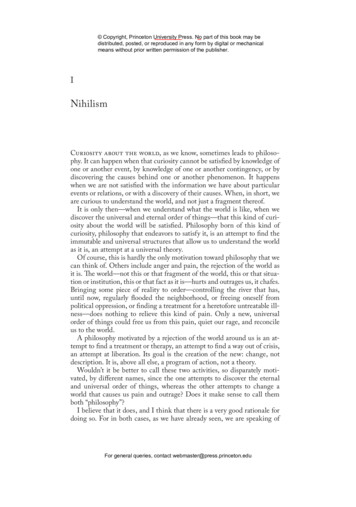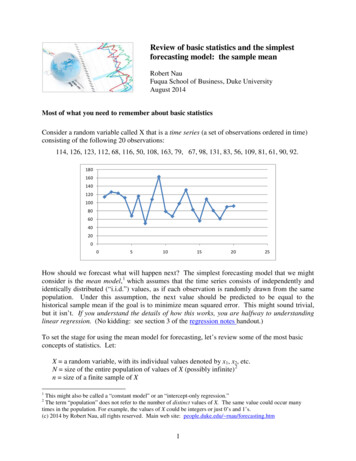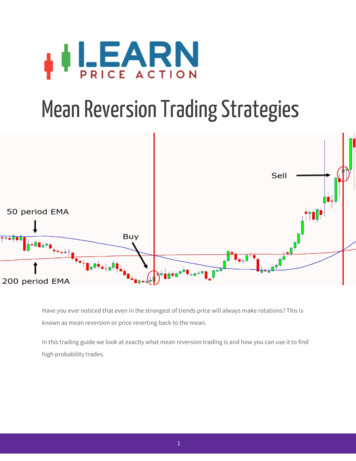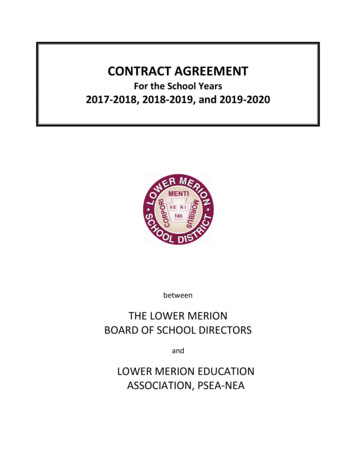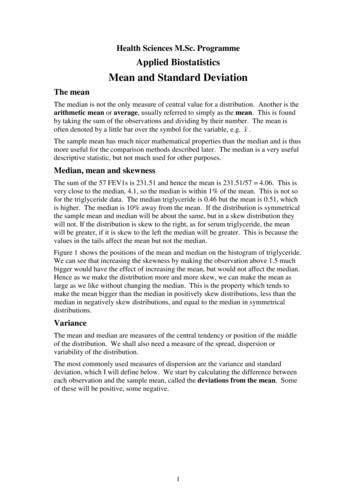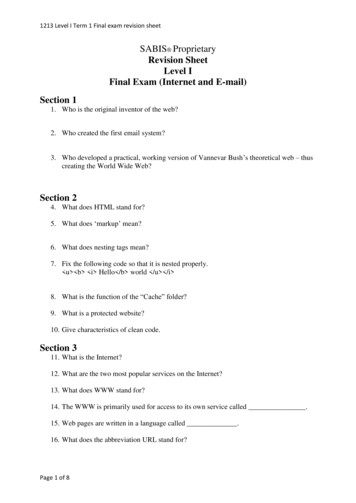
Transcription
What Does it Mean to Seek the Kingdom of God?Matthew 6:33 and Luke 12:31 in the Contexts ofthe Sermon on the Mount and the Lucan ParablesDavid R. Bickeldawningrealm.orgDecember 13, 2001; text last modified (except typo correction) July 10, 2002Footnotes 3-5 added August 29, 2005; footnotes 1-2 added November 21, 2007Appendix added June 10, 2008IntroductionWhat will I eat? How will I pay the bills? How will I have a happy marriage?How will I have a successful career? Everyone seems to be preoccupied with thesekinds of concerns, but Jesus calmed his disciples by giving them a higher purpose. Hetold them not to worry about their needs in this world, but to instead seek God’skingdom, having the promise that their heavenly Father would then also meet allthose needs: “.do not be anxious, saying, ‘What shall we eat?’ or ‘What shall wedrink?’ or ‘What shall we wear?’ For the Gentiles seek all these things; and yourheavenly Father knows that you need them all. But seek first his kingdom and hisrighteousness, and all these things shall be yours as well” (Matt 6:31-33, RSV). Theparallel account omits “and his righteousness” and adds an assurance: “.seek hiskingdom, and all these things shall be yours as well. Fear not, little flock, for it is yourFather’s good pleasure to give you the kingdom” (Luke 12:31-32). The first step inunderstanding what it means to seek the kingdom of God is to determine what Jesusmeant by “his kingdom.” This is because Jesus used the word translated as kingdomin a way that is very different from the typical usage of kingdom in English as theland or people ruled by a king.
2In Matthew, Mark, and Luke, the “kingdom of God” is usually God’s active ruleover his creation, especially in saving his people from their sins and theconsequences of those sins. (Matthew often uses “kingdom of heaven” instead of“kingdom of God,” but the two terms are synonymous (Matt 13:31a Mark 4:30 Luke 13:18), so “kingdom of heaven” does not refer to heaven as a place, but toGod’s reign as King, reflecting the Jewish avoidance of direct reference to God.) Thekingdom of God is not only God’s rule over his obedient subjects, but includes hisvictory over their spiritual enemies through Jesus, beginning in the present age (Matt12:28; Luke 1:68-75; 11:20). The kingdom of God has been concisely defined asGod’s “acting in his sovereign power to deliver man from the destructive powers thatenthrall him” (Beasley-Murray, 1989). The central thesis of Ladd (1974) is that theprophets’ hope of the kingdom of God was inaugurated in the person of Jesus in thispresent age, before its consummation begins the age to come. God asserted His rulein history by defeating Satan and death through the work of Jesus, even though Godwill not complete his display of authority until Jesus returns in judgment, when he willstart the new world order.
3However, Ladd (1974, ch. 8, pp. 205-217) pointed out that the kingdom ofGod does not always literally mean the dynamic reign of God, but that it sometimesrefers to the gift of life and salvation achieved by that reign. Jesus’ disciples are toseek the kingdom as the most valuable of possessions and the Father gives thekingdom to them (Matt 6:33; 13:44-46; Luke 12:31-32). Those who receive thekingdom in the present age will enter the kingdom in the age to come (Mark 10:15;Luke 18:16-17). Those who are poor in spirit, who are persecuted for righteousness’sake, have the kingdom (Matt 5:3, 10). When the Son of Man comes (Matt 25:31),the righteous will inherit the kingdom (v. 34); kingdom here is the same as eternallife (v. 46). Inheriting eternal life, inheriting the kingdom, and receiving eternal lifeare equivalent (Mark 10:17, 23-24, 30) and are associated with being saved (v. 26).This salvation involves saving one’s true life, as opposed to saving one’s life in thisage (Matt 10:39; Mark 8:35; Luke 17:33), and culminates in bodily resurrection(Luke 20:34-36) and restored communion with God in the age to come (Matt 5:8;25:21, 23; Mark 14:25; Luke 14:16-24). Although the kingdom concept is primarilyoriented to the future, Jesus also brought salvation and fellowship with God to thepresent age (Luke 19:10-11; Mark 2:15-19), though to a lesser, incomplete degree.Such salvation included other gifts enjoyed in this life, such as physical healing (Mark5:34; 10:52), temporary resurrection (Matt 11:4-5), deliverance from demonicpossession (Luke 8:36), forgiveness of sins (Mark 1:4; 2:10; Luke 7:48), andrighteousness (Matt 6:33).That the kingdom of God to be sought (Matt 6:33; Luke 12:31) is this gift ofsalvation brought by the rule of God, rather than the rule of God itself, will also beseen below. To seek the kingdom of God is to actively receive the eternal life thatJesus brought. Seeking salvation does not end at the time of conversion, butcontinues throughout the life of each disciple of Jesus. What this entails will becomeclear from looking at the kingdom-seeking passages in the context of Luke and its
4sequel (Acts) and in the context of Matthew. Matthew’s version is treated secondsince it is complicated by the exhortation to seek God’s righteousness as well as hiskingdom.Luke-Acts on seeking the kingdomThrough parables and illustrations from nature, Jesus contrasted seeking thefuture salvation of the kingdom with seeking the pleasures of this age (Luke 12:1346). In the parable of the rich fool (vv. 13-21), Jesus rebuked a man for being overlyconcerned about receiving his share of the inheritance, as if one’s wealth is themeasure of success in life. The rich man of the parable depended on the wealth hehad accumulated to take care of him in the future, but found that all his work was invain since he had not provided for his future after his death. Expanding on the lessonof the parable (“therefore,” v. 22), Jesus later gave the discourse on anxiety to hisdisciples (vv. 22-31). He told them not to worry about the needs of this life because,since God cares for the birds and the lilies, which do not toil, he will much morereadily provide for his children. Rather than worrying about earthly needs, like thenations do, Jesus’ disciples must seek the kingdom of God, with the promise that Godwill meet all those needs. These injunctions are not two independent argumentsagainst worrying, the first based on God’s fatherly care for his creation and thesecond based on seeking the kingdom, but are part of the same argument since Godis both Father and King of his people (Beasley-Murray, 1989). It is not that God onlygives his people food and clothing only to the extent that they seek his kingdom: Godrichly provides for even those with “little faith” (v. 28) because he values them farabove the birds and flowers. The Father will always meet the needs of those whoseek the kingdom,1 however imperfectly, since they are the ones who are truly hisThis interpretation overlooks the Father's provision for the unjust (Matthew 5:45; Luke 6:35-36; Acts14:17). A more solid exposition distinguishes how to overcome anxiety—believe the Father will feed andclothe you (Luke 12:22-24, 27-30)—from why to overcome anxiety—it serves no purpose (vv. 25-26) and1
5children. That seeking the kingdom is not an isolated action, but a way of life forJesus’ disciples, is also seen in the description of Joseph as a good, righteous manwho looks for the kingdom (23:50-51). On the other hand, those who are notchildren of God do not even have “little faith,” which is accepted by God (17:5-6), butno faith, consistently seeking the things of this life (12:30), so Jesus told the disciplesnot to act like them, but like the children of God. Since the kingdom is somethingthat one can seek instead of earthy things, it is something that can be possessed; infact, the kingdom is a possession given by the Father (12:32). Thus, kingdom here isthe salvation brought by Jesus, as noted in the Introduction. In addition to theblessings of salvation, God promised to give His children what they need in this age(Luke 12:31). Ladd (1974, p. 137) inferred from the fact that “all these things” areadded to the kingdom that the kingdom can be experienced in the present age. It istrue that salvation is experienced to some extent upon conversion; this includes thepresent gifts of forgiveness and the Holy Spirit (Luke 3:16; 11:9-13; Acts 1:5; 2:3841; 8:20), who brings boldness in proclamation, wisdom, comfort, faith, and joy(Acts 4:31; 6:3-5; 9:31; 11:24; 13:52). However, in the next saying (Luke 12:3234), Jesus made it clear that the kingdom will be primarily enjoyed in the future: theblessings of the kingdom are described as eternal treasures in the heavens.Although, like the kingdom (Luke 18:17), these heavenly treasures are said to bepossessed now, the contrast with the temporary treasures of the earth reinforces themessage of the parable that led to the discussion on worry: the future state is farmore important than the present state (vv. 13-21). The theme of seeking future,eternal treasure rather than present, temporary treasure is continued in the parablesthat follow immediately (12:35-46). In two of these parables, servants must be readyfor the coming of their master, and in the third, a householder must be ready for thedistracts you from seeking the treasure of the kingdom (vv. 31-34). The unconditional promise that yourcompassionate Father will satisfy your needs frees you to seek with abandon what is truly valuable (vv. 3031; 10:38-42).
6coming of a thief. In each case, the unexpected coming represents the coming of theSon of Man in judgment at an unknown time in the future. In this context, beingready means seeking the kingdom of God rather than earthly treasure (vv. 30-34).Thus, when the Son of Man comes, those who are found seeking the kingdom will berewarded (vv. 38, 42-43), but those who are found seeking immediate pleasure willbe punished and put with the unfaithful (vv. 45-46). The message of these parables,to be ready for future judgment, is the same as that of the parable of the rich fool,where the unexpected judgment occurs at death rather than at the coming of theSon of Man.Jesus also warned his disciples to be ready for his coming in his eschatologicaldiscourse (Luke 21:5-36). When the disciples saw all the things related to thedestruction of Jerusalem, which would take place in their generation (Ladd 1974, pp.320-321), they would know that the kingdom of God, in the coming of the Son ofMan, was near (vv. 20-33). The coming of the kingdom will mean redemption for thedisciples (v. 28), but will come unexpectedly to the rest of the world (v. 34-35).Thus, disciples must be ready for that day by making sure that their hearts do notbecome weighed down with gluttony, drunkenness, or the cares of this life (v. 34),which is what happened to those who, having heard the word of the kingdom, laterfell away because of temptation or the cares, riches, and pleasures of life (8:13-14);temporary deliverance from demonic power is of little value (11:24-26). Jesus wasagain teaching that one’s heart reveals where his or her treasure is: the heart thatseeks the kingdom will have treasure in heaven, but the heart that seeks the thingsof this life will only have treasure on earth (12:30-34). The disciples were to pray notonly that they would be ready for the coming of the Son of Man, but also that theywould escape the things that would take place in their generation (21:36). Thehistorical judgment on Jerusalem pointed to the eschatological judgment on thewhole world, following the pattern of the Old Testament prophets: “the proclamation
7of the future visitations of God, both historical and eschatological, are designed tobring God’s people into conformity with the divine will in the present” (Ladd 1974, p.69, cf. p. 315). That disciples pray to be able to stand before the Son of Man at hiscoming (21:36) shows that they seek to persevere and receive the kingdom by God’spower, not by their own effort, as will also be clear from the eschatological discoursein Matthew. Those who would undergo persecution were specifically promised eternallife as compensation for their endurance (vv. 16-19; 6:22-23), so they were not leftin doubt as to whether they would remain in the kingdom. The need to persevere isseen in the case of Judas, who, although numbered with the disciples, eventuallyrevealed his heart and did not ultimately receive the kingdom (Luke 22:22; Acts1:25). The faith of Peter, on the other hand, did not fail, but only because Godanswered the prayer of Jesus (Luke 22:31-32), not because of the strength of Peter’swill (22:33). Paul encouraged later disciples to remain in the faith and in the grace ofGod, even in the face of persecution, since only in so doing would they inherit thekingdom of God (Acts 13:43; 14:22).Jesus also exhorted his followers to be ready for the future judgment in histeachings on discipleship. Just as the Son of Man had to suffer before his exaltation,those who follow him must daily deny themselves and give up their lives in this worldto save their lives for the kingdom at his coming; this daily carrying of the crossincludes exposure to persecution for Jesus and his words (Luke 9:22-26). In fact, itinvolves a renunciation of everything in the present age, including family members(14:25-33). For some, this renunciation entails an actual loss of family relationships(9:57-62) or of earthly possessions for treasures in heaven (18:22-30), as was seenin the discourse on seeking the kingdom (12:31-34). Such loss is compensated notonly with eternal life in the age to come, but also with family and possessions in thepresent age (18:29-30); this is an instance of the Father’s provision for the earthlyneeds of those who seek the kingdom instead of seeking those needs (12:22-31).
8That disciples are compensated with eternal life for their sacrifices does notimply that the compensation is an earned payment. It is impossible for people toenter the kingdom by their own ability; the willingness to renounce everything for thekingdom can only come from God and was not given to everyone (18:22-30). Therepentance leading to seeking the kingdom above material gain (3:8-14) is a giftfrom God and the exalted Lord Jesus (Acts 3:26; 5:31; 11:18), given only to thoseappointed for eternal life (13:48).2 As noted above, disciples constantly rely on Godfor the ability to persevere in seeking the kingdom and to stand before the Son ofMan when he comes in judgment (Luke 21:34-36). Thus, they regularly pray for Godto forgive them and to keep them from falling into temptation (11:4). Indeed, Jesuscame to save God’s people (2:11; 19:10) from their spiritual enemies, since they arehelpless to save themselves, so that they can serve him in holiness andrighteousness (1:71-77) under the rule of Jesus (1:31-33). Sinners who in faith seekthis deliverance as an unmerited gift will be forgiven and justified rather than thosewho rely on their own righteousness (18:9-14; Acts 13:38-39; 15:10-11) since evenflawless obedience would fail to make them worthy of the kingdom (Luke 17:7-10).Jesus freed his disciples from anxiety and fear by assuring them that their Father willgive them the kingdom they seek (12:31-32). So, as Calvin (1845) commented,“When Christ plainly declares, that God hath given us the kingdom, and for no otherreason, but because it so pleased him, it is perfectly manifest, that it is not obtainedby any merits of works.”The contrast between anxiously seeking the cares of this life and confidentlyseeking the salvation of the kingdom (Luke 12:22-34) is exemplified in the account ofMartha’s excessive preparations and Mary’s learning from Jesus (10:38-42). Jesusrebuked Martha for being worried and bothered with “many things,” things that theNonetheless, the Triune God sincerely offers salvation to those who will ultimately refuse it (Luke 13:33-34;Acts 7:51).2
9nations of the world also anxiously seek (12:29-30). She was not reprimanded forattending to the things of the house, but for doing so to the point of distraction andfor criticizing Mary for not sharing her anxious toil. Jesus commended Mary forinstead seeking the “one thing” that was truly needed, the salvation present in theword of the kingdom (4:18; 8:10-11, 15).The parables that complement the parables surrounding the discourse onanxiety expand on the idea that seeking the treasure of the kingdom leads to sharingwith the poor (Luke 12:31-33). The parables of Luke 10:25-18:14 are arranged as achiasmus (ABC.CBA), so that the first parable is parallel to the last parable, thesecond to the next-to-last, etc. This structure can be seen by listing each group ofparallels with the same degree of indention and color:The good Samaritan (10:25-37)The friend at midnight (11:5-8)The good Father, beginning with “Who of you.?” (11:11-13)The rich fool (12:13-21)The demands of stewardship (12:35-48)Three warnings to repent (13:1-9)The mustard seed and yeast (13:18-22)The lower place at the banquet (14:7-10)The proud will be humbled (14:11a)The humble will be exalted (14:11b)The banquet invitations (14:15-24)Considering the cost of discipleship (14:25-33)Three parables of the lost coming to repentance (15:1-32)The dishonest steward (16:1-13)The rich man and Lazarus (16:19-31)The unworthy slaves, beginning with “Who of you.?” (17:7-10)
10The persistent widow (18:1-8)The Pharisee and the tax collector (18:9-14).Thus, the parables just before and just after the discourse on anxiety (12:22-34), theparable of the rich fool and the parables of stewardship demands, complement theparable of the dishonest steward and the parable of the rich man and Lazarus. Theparallel stewardship parables illustrate different truths: that servants of the Son ofMan must be found faithful when he returns (12:35-48) and that they must shrewdlydistribute their unrighteous money to others if they are to have true, eternal wealthsince the use of money reveals whether they serve it or God (16:1-13). Theimplication is that using one’s wealth to help the poor is necessary to being foundfaithful at the coming of the Son of Man. In both the parable of the rich fool and theparable of the rich man and Lazarus, a rich man loses everything when he dies.Reading the parables together, failure to be “rich toward God” is manifested in failureto give generously to the poor. Those who are overly concerned about providing forthemselves in this life do not tend to think they can afford to provide much forothers. Between the parable of the dishonest steward and the parable of the richman and Lazarus is a brief exchange between Jesus and the Pharisees (16:14-15). Inloving money to the point of scoffing at Jesus’ parable of the dishonest steward andin their self-justification before men, they embodied seeking treasure on earth, likethe nations of the world, rather than seeking the kingdom of God (12:30-33; 22:2330). Jesus contrasted the worldly values of men with the values of God, who knowsthe heart: “what is exalted among men is an abomination in the sight of God”(16:15). The conclusion of the chiasmus of parables (18:14) also condemns the selfrighteousness of the Pharisees, echoing the center of the chiasmus (14:11): “everyone who exalts himself will be humbled, but he who humbles himself will be exalted.”In other words, those who proudly seek earthly wealth or recognition will eventually
11lose everything, but those who humbly seek the kingdom of God will enter it whenthe Son of Man comes in his glory.Matthew on seeking the kingdomThe discourse on anxiety in the Sermon on the Mount (Matt 6:25-34) has adifferent context and three main internal differences from the parallel passage inLuke-Acts (Luke 12:22-32): the addition of “first,” the addition of “and hisrighteousness” (Matt 6:33; cf. Luke 12:31), and an alternate saying at the end of thediscourse (Matt 6:34; cf. Luke 12:32). While these dissimilarities reflect differentemphases, they do not alter the essence of the message that the salvation of thekingdom must be sought above all earthly cares.The “therefore” at the start of the discourse (Matt 6:25) refers back to threepassages that contrast loving God with loving riches (vv. 19-24). The first of these(vv. 19-21) is essentially the same as the parallel in Luke-Acts (Luke 12:33-34),except that the Sermon on the Mount has “Do not lay up for yourselves treasures onearth” (Matt 6:19) in place of “Sell your possessions and give alms” (Luke 12:33).Matthew’s version appears to be more generally applicable since while all believerswere to seek heavenly treasure above earthly treasure, not all were to literally giveall their wealth to the poor (Luke 3:10-14; 8:1-3; 19:1-10; Acts 5:4). Just as theheart determines whether one’s treasure is in heaven or merely on earth (Matt 6:1921), one’s eye (what is looked to as the source of satisfaction) determines whetherhis or her body is full of light or darkness (vv. 22-23). This is because no one canlove and serve both God and riches; one will always take priority over the other (v.24). “Therefore” (v. 25), instead of anxiously seeking the food, drink, and clothingthat the Gentiles seek, God’s children are to seek first God’s kingdom and hisrighteousness (vv. 25-33). Thus, as in Luke-Acts, salvation, with an emphasis on the
12future enjoyment of eternal life, takes precedence over the material possessions ofthe present age.The modification of “seek” with “first” (Matt 6:33) in the Sermon on the Mountguards against the misunderstanding that the needs of this life should not beattended to at all. The need of food is important enough that it is to be prayed fordaily, along with the more important blessings of the kingdom (vv. 11-13). Disciplesare to handle each day’s earthly concerns as they arise, rather than to anxiouslyworry about the next day’s concerns as if God does not provide for those who seekhis salvation and righteousness (vv. 33-34). It follows that saving money is not initself condemned, but seeking eternal life and service to God must always takepriority in the heart (vv. 19-24).In the context of Jesus’ Sermon on the Mount, the “righteousness” to besought with the kingdom (6:33) includes obedience to the law of Moses, but therighteousness of those in the kingdom surpasses that of the respected teachers ofthe law, the scribes and Pharisees (5:17-20).3 In his diatribe against the scribes andPharisees (23:1-36), Jesus exposed their righteousness as based on the values of thepresent age rather than on those of the kingdom of God:Seeking God's "righteousness" might instead mean seeking God's will, not in the sense of moralgoodness, but "in the sense of God's saving activity," and thus "righteousness" may be an explanation of"kingdom" in Matthew 6:33 (D. A. Hagner, 1993, Matthew 1-13, Word Biblical Commentary, Word). Thishas the strength of identifying righteousness with the kingdom as the "one thing" needed. The ethicaldefinition has also been combined with the redemptive-historical definition: "The command to seek thisrighteousness means seeking what God has righteously done in Jesus. In the Christian community, prayersfor wealth and for ordinary, necessary things are to be replaced with prayers asking for God's righteousnessof love and reconciliation. The person who prays for this righteousness need not pray for anything else, asall these things will be given to him" (p. 224 of D. P. Scaer, The Sermon on the Mount: The Church's FirstStatement of the Gospel, 2000, Concordia Publishing House). This Christological interpretation holds that"Christ's promise in the Sermon to fulfill the Law and the Prophets (5:18) is his own affirmation of theirauthority for requiring his death (26:24, 31, 54), but by fulfilling them, he assumes them into himself andpreserves them in his teachings. His words now take the place of honor (28:20). The Father's command tolisten to Jesus (17:5) applies first to the Sermon on the Mount and then to the entire gospel of Matthew" (p.270). Indeed, Jesus did not come as yet another legal expert: he denounced those teachers of the lawwhose rigidly literal interpretations ironically underemphasized its most demanding commands while at thesame time laying heavy burdens on the Jewish people (e.g., 12:1-14; 15:1-20; 23:1-39). In sharp contrast,Jesus gently invited those who bore heavy burdens to come to him for rest (11:28-30).3
131. They did all their righteous deeds to be noticed and honored by men,keeping the visible, external parts of the law but neglecting its demandfor a clean, sincere heart (vv. 5-12, 23-28).2. They not only refused to enter the kingdom, but they prevented othersfrom entering (v. 13).3. Viewing gold as more important than the temple, they broke vows for thesake of material gain (vv. 16-22).4. They would kill the true messengers of God (vv. 29-36).Ultimately, their “righteousness” was only an appearance of righteousness beforemen (v. 28). Much of the Sermon on the Mount contrasts this superficialrighteousness, which has value only in the present age, with the righteousness ofGod, the righteousness needed to enter the kingdom in the age to come (7:21-27).Those who gave alms, fasted, and prayed to be seen by men already had the rewardthey were seeking, but those who did so in secret would be rewarded by God in thefuture (6:1-8, 16-17). True righteousness extends to the heart (5:3, 8), whichcannot be seen by men, and even includes active love for enemies (5:38-47) and theavoidance of sinful states of mind like anger (5:21-26), lust (5:27-32), insincerity(5:33-37), greed (6:19-24), and unbelief (6:30-32). Such a pure heart does lead torighteous actions that are seen by men, but for God’s glory, not man’s glory (5:1416; 7:15-20). The truly righteous ones do not exalt themselves above others, as thePharisees did (23:6-12), but are humble, merciful, forgiving, and nonjudgmental(5:5, 7; 6:14-15; 7:1-2; cf. 18:1-4, 21-34). They value life in the kingdom so muchthat they would sacrifice anything in the present life to attain righteousness (5:2930). Therefore, above all other things, they seek entrance to the kingdom in the ageto come by seeking righteousness in the present age (6:33; cf. 25:31-46).This righteousness of the kingdom is not for those who think that they arealready righteous, but only for those who hunger and thirst for righteousness (5:6),
14striving to be perfect as their heavenly Father is perfect (5:48). Knowing that theyneed daily forgiveness from God because their flesh is weak, they rely on God tokeep them from temptation and to deliver them from the evil one (6:12-13; 26:41).“God with us,” Emmanuel (1:23), is the one who delivers them, as when hedemonstrated the presence of the kingdom by casting out demons (12:28). Thename “Jesus” aptly summarizes his entire ministry of the kingdom: he saved hispeople from their sins (1:21). Thus, God’s righteousness is not merely God’s demandplaced on man, as per Pryzybylski (1980, pp. 89-91), but is his gift to all of hischildren who ask for it (7:7-11). Their righteous obedience to the law and prophets,summarized in the Golden Rule, is a response to their Father’s inclination to answertheir prayers (v. 12). Because of the caring Father’s provision, his children need notbe any more anxious about attaining righteousness than about attaining their bodilyneeds (6:25-34); they can rejoice and be glad, knowing that they have treasure inheaven (5:10-12). Hence, the righteous find rest in following Jesus, whose yoke iseasy and whose burden is light (11:28-30).That God answers requests for righteousness does not put the initiative ofsalvation in the hands of man. Rather, true prayer is an expression of faith (8:1-13;9:27-29; 21:21-22; cf. 17:19-20 with Mark 9:28-29) and faith in the message of thekingdom is a gift from God. The Father revealed to Peter that Jesus is the Messiah(16:16-17). Likewise, the Father is known by those to whom the Son reveals him andthe things of the kingdom are hidden from the rest (11:25-30). Jesus spoke inparables so that only the disciples could understand the message of the kingdom;outsiders were intentionally left in ignorance (13:10-18). Therefore, only thoseselected for revelation from God will have the faith needed to humbly seek hisrighteousness through prayer.In the eschatological discourse (24:4-25:46), the righteous are three timescalled the “elect” (24:22, 24, 31). God would shorten the time of tribulation so that
15the elect will be saved (v. 22). The false prophets and messiahs could even deceivethe elect, if that were possible (v. 24). The elect will be with the Son of Man at hiscoming (v. 31). Thus, by the sheer will of God, the elect are certain to endure to theend (v. 13), to be found ready for judgment when the Son of Man comes (24:3725:30). This readiness that secures entrance to the kingdom in the age to comeconsists in righteousness expressed in good works (25:31-46) and includes therenunciation of the disciple’s life that was emphasized above in the discussion ofLuke-Acts (Matt 16:24-27). On that day, people will be judged for whether they hadthe kingdom-oriented righteousness demanded by the Sermon of the Mount, ratherthan the world-oriented righteousness of the Pharisees (7:21-49). Only thatjudgment will reveal with certainty who God’s elect are (13:24-30).In conclusion, God graciously gives his elect the faith to persevere in seekingeternal life and deliverance from their sins as their first priority. They will not attainperfect righteousness in this age since the kingdom of God has not yet fully come.Even so, the righteousness that God gives them results in good works that will setthem apart from the unrighteous in the day of judgment, when God will give hischildren the kingdom. Thus, in agreement with Luke-Acts, salvation in Matthew is notmerited, but received purely by the grace of God. This reception of undeserved favoris clearly illustrated by the parable of
eternal treasure rather than present, temporary treasure is continued in the parables that follow immediately (12:35-46). In two of these parables, servants must be ready for the coming of their master, and in the third, a householder must be ready for the distracts you from seeking the treasure of the kingdom (vv. 31-34).


